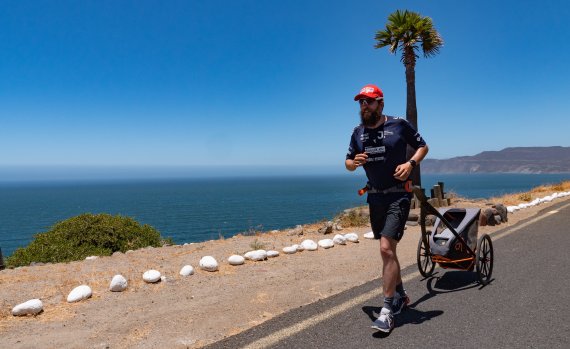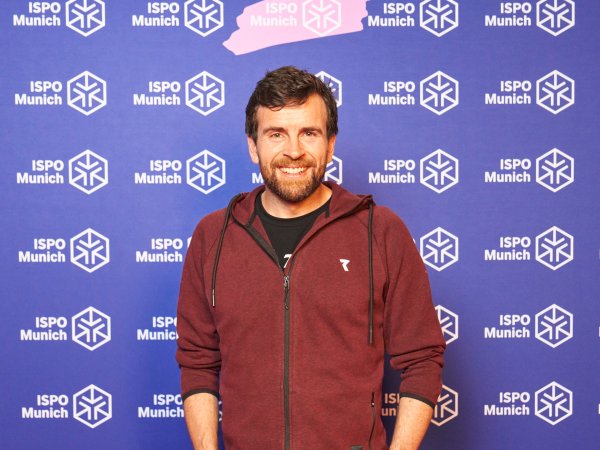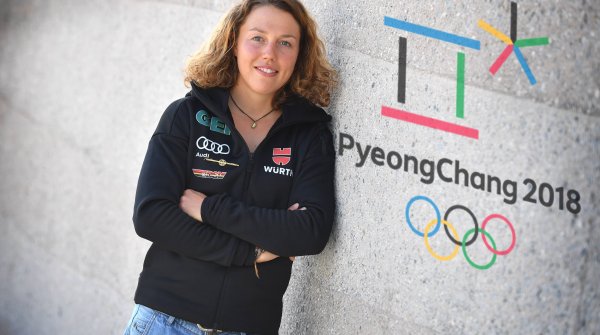Jonas Deichmann has one crazy project after another. In 2023, he crossed the USA twice in one go, once on his bike and once on foot. With his latest project, he is supposedly coming full circle back to triathlon, the sport that made him famous around the world. However, he is not going around the world as the German Forrest Gump, but as an Ironman for four months through Franconia.
"I'm 36 now and nothing hurts yet, I don't have any injuries. But when I talk to colleagues over forty, that will change at some point." That's why he's taking on the biggest physical and mental challenge yet with his next project. From May onwards, Deichmann will be running daily on the course of the Challenge Roth cycling, running and swimming - 120 long-distance triathlons over 120 days in a row, according to the plan. Between the USA and his next mission, he spoke to us in an interview - among other things about his life beyond the comfort zone and why you should run towards problems.
News Update:
On September 5, 2024, Jonas Deichmann set a new world record by completing the 120th Ironman in consecutive days. Congratulations!
Sometimes it's like Monopoly, you just can't get past the lot. Jonas Deichmann has a tip for everyone, especially those who play sport or are pursuing their own sporting projects: "Just do it, because the hardest part of any big project - whether as an adventurer or developing a new product - is getting from the idea to implementation. In my opinion, the hardest part is getting to the starting line."
Between everyday life or thinking about getting fitter and training more is certainly an understandable hurdle for many people. "If you commit yourself wholeheartedly, you'll find a solution. Most projects fail before they even get off the ground, not during them. "
Deichmann also has to navigate risks such as not being sufficiently prepared in the run-up to his own projects. "I only reach my peak during my adventures, especially with long projects."
Isolation, food poisoning, dangerous traffic on the routes - if you read about Deichmann or watch the films about his adventures, the question arises as to what drives him to the starting line again and again. Why does he do it all? "Of course it's nice to set a record at the end, but that's not really what it's about for me. It's getting there that really counts."
Having a challenging goal, even if it is a personal one, is very important to Deichmann. Nevertheless, he is primarily concerned with creating unique memories. "Not everyone wants to do a triathlon around the world, but I do." The moments that arise are what get him out of bed in the morning. "Whether it's an encounter with someone in a foreign country or a great sunset in the middle of the Mojave Desert after a hard day. I draw my energy from that and will remember it for years to come."
Of course, his adventures were not only full of good moments, but also scary ones. "If you're a cyclist, traffic is by far the most dangerous thing," says Deichmann. In a near-accident in Russia in 2019, a truck mirror almost knocked him off his bike. "Since then, I've stopped chasing speed records, because as a cyclist you have to be on the big roads to break them." Otherwise, he deals openly with his fears.
According to Deichmann, 95 percent of his records are set in his head. Past successes or difficult moments also play their part in his mental strength. "I can now remind myself that I survived a snowstorm in Siberia or food poisoning in the Sahara." So even when new problems arise, a solution will be found.

He also sees the greatest potential for personal development in making his own life challenging and solving problems. "I love microadventures as a concept. Not everyone has to travel around the world, but have you ever bivouacked or cycled 100 kilometers, pitched your tent somewhere and returned home the next day?" For many, this is a step out of their comfort zone, developing skills that can be used for many things.
And for all those who want to take a more professional approach and are looking for funding or sponsors, Deichmann advises them to start by making advance payments. Here, too, the rule is: do instead of making big announcements.
And he also provides an insight into his own finances: "Of course I need sponsors, because I live off them and want to for many years to come. With new projects, I always ask myself: would I do it even if I didn't earn any money?" The answer always has to be "yes", also for the authenticity of his personal brand. He is largely financed by sponsors and motivational speeches at companies. His bestsellers, documentaries and commercials also contribute to his income. And his partners also have to be a good fit for him, such as Ryzonwith whom he maintains a close, trusting relationship.
In addition to our questions, Jonas Deichmann also had one of his own. "Many sports are sustainable, but not all, because sport is a very broad topic. In some sports and areas of the sports industry, the topic needs to be put more clearly on the agenda and addressed. I would be really interested to hear what solutions the sports industry has come up with." He is personally concerned about how to better deal with environmental challenges globally and repeatedly emphasizes this as an important point during his adventures. He is not alone in this. After all, this question is on the minds of many thought leaders in the industry who are already eagerly seeking solutions for the future.
What are some of the most notable projects of Jonas Deichmann?
Deichmann has already crossed the USA twice and now plans to complete 120 triathlons on the long-distance within 120 consecutive days.
Why does Jonas Deichmann constantly seek new challenges?
He sees life outside the comfort zone as an opportunity for personal growth and to create unique memories that energize him.
How does Jonas Deichmann deal with fears and risks during his adventures?
Deichmann accepts fears and stays focused. He emphasizes the importance of mental training and believes it's crucial to feel confident in challenging situations.
How does Jonas Deichmann finance his adventures?
Deichmann secures sponsors and income from bestsellers, documentaries, and motivational speeches at companies. He emphasizes the authenticity of his partners and financial decisions.
Why is sustainability in sports important to Jonas Deichmann?
Deichmann is interested in how the sports sector can become more sustainable. He emphasizes the urgency of addressing environmental challenges and supports solutions for a more sustainable future.
- ISPO awards
- Mountain sports
- Bike
- Design
- Retail
- Fitness
- Health
- ISPO Job Market
- ISPO Munich
- ISPO Shanghai
- Running
- Brands
- Sustainability
- Olympia
- OutDoor
- Promotion
- Sports Business
- ISPO Textrends
- Triathlon
- Water sports
- Winter sports
- eSports
- SportsTech
- OutDoor by ISPO
- Heroes
- Transformation
- Sport Fashion
- Urban Culture
- Challenges of a CEO
- Trade fairs
- Sports
- Find the Balance
- Product reviews
- Newsletter Exclusive Area
- Magazine








